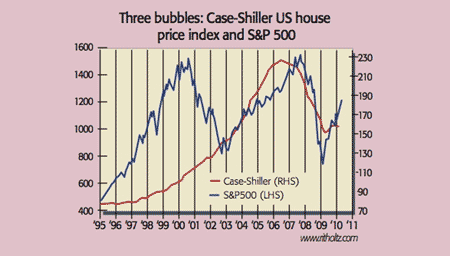Get the latest financial news, insights and expert analysis from our award-winning MoneyWeek team, to help you understand what really matters when it comes to your finances.
You are now subscribed
Your newsletter sign-up was successful
Want to add more newsletters?

Twice daily
MoneyWeek
Get the latest financial news, insights and expert analysis from our award-winning MoneyWeek team, to help you understand what really matters when it comes to your finances.

Four times a week
Look After My Bills
Sign up to our free money-saving newsletter, filled with the latest news and expert advice to help you find the best tips and deals for managing your bills. Start saving today!
With US stocks up by almost 80% since last March, the Fed is "playing with fire" by allowing another bubble to develop, says Jeremy Grantham of GMO. "Speculators are not stupid." They have seen that after previous crashes, "a long, artificial period of low rates and easy financial borrowing has been delivered" thus blowing up another bubble. They also know that Fed chairman Ben Bernanke subscribes to the Greenspan doctrine of not tackling bubbles as they build, but merely limiting the fallout when they burst. So, they reason, why not have a punt?
Another cause to worry is that the quick economic recovery that would force the Fed to raise rates is hardly likely, given the fragile, deleveraging private sector. David Rosenberg of Gluskin Sheff calculates that leaving aside the monetary and fiscal stimulus in the system, GDP growth would have been an annualised 0.7% in the first quarter, rather than the reported 3.2%. Not much "organic vigour" there.
So if the economy just "limps along", we run a "very real danger of a third dangerous bubble in stocks and in risk-taking in general" as interest rates stay at historic lows and more speculators join the party, says Grantham. The S&P could regain its old highs of around 1,600 over the next 18 months and other measures of risk would rise even further.
MoneyWeek
Subscribe to MoneyWeek today and get your first six magazine issues absolutely FREE

Sign up to Money Morning
Don't miss the latest investment and personal finances news, market analysis, plus money-saving tips with our free twice-daily newsletter
Don't miss the latest investment and personal finances news, market analysis, plus money-saving tips with our free twice-daily newsletter

But bubbles always burst. And the trouble is that, with rates low, governments overspent and the financial system still weak, there would be no effective way to mitigate the shock impact of "another collapse of a major asset class". So we'd better hope that the equities upswing is derailed by, say, a rapid rise in commodity prices or contagion in Europe, reckons Grantham.
It is certainly worrying that assets ranging from corporate debt to commodity currencies have been flying high again. "Bail-outs and other stimulus policies have succeeded in restoring many of the bubble elements that were in financial markets in 2006-2007," says Timothy Lee of Pi Economics. The FT points to the record volumes of junk debt issued in the last quarter. Meanwhile, US junk prices, according to one measure, are back at June 2007 levels. It seems we have, as Stephanie Pomboy of Macro Mavens puts it, "learnt nothing from our near-death experience". The danger of yet another bubble developing is another reason to stick with defensive stocks.
Get the latest financial news, insights and expert analysis from our award-winning MoneyWeek team, to help you understand what really matters when it comes to your finances.
MoneyWeek is written by a team of experienced and award-winning journalists, plus expert columnists. As well as daily digital news and features, MoneyWeek also publishes a weekly magazine, covering investing and personal finance. From share tips, pensions, gold to practical investment tips - we provide a round-up to help you make money and keep it.
-
 Last chance to invest in VCTs? Here's what you need to know
Last chance to invest in VCTs? Here's what you need to knowInvestors have pumped millions more into Venture Capital Trusts (VCTS) so far this tax year, but time is running out to take advantage of tax perks from them.
-
 ISA quiz: How much do you know about the tax wrapper?
ISA quiz: How much do you know about the tax wrapper?Quiz One of the most efficient ways to keep your savings or investments free from tax is by putting them in an Individual Savings Account (ISA). How much do you know about ISAs?

